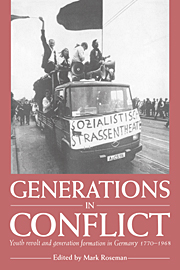Book contents
- Frontmatter
- Contents
- Contributors
- Acknowledgements
- List of abbreviations
- 1 Introduction: generation conflict and German history 1770–1968
- 2 The ideal of youth in late eighteenth-century Germany
- 3 Young Germans and Young Germany: some remarks on the history of German youth in the late eighteenth and in the first half of the nineteenth century
- 4 The battle for the young: mobilising young people in Wilhelmine Germany
- 5 Jewish politics and generational change in Wilhelmine Germany
- 6 The ‘front generation’ and the politics of Weimar Germany
- 7 The New Woman and generation conflict: perceptions of young women's sexual mores in the Weimar Republic
- 8 Generations of German historians: patronage, censorship and the containment of generation conflict 1918–1945
- 9 Gender, generation and politics: young Protestant women in the final years of the Weimar Republic
- 10 The Hitler Youth generation and its role in the two post-war German states
- 11 The BDM generation: a female generation in transition from dictatorship to democracy
- 12 A generation twice betrayed: youth policy in the transition from the Third Reich to the Soviet Zone of Occupation (1945–1946)
- 13 The generation conflict that never was: young labour in the Ruhr mining industry 1945–1957
- 14 The German Kriegskinder: origins and impact of the generation of 1968
- Index
1 - Introduction: generation conflict and German history 1770–1968
Published online by Cambridge University Press: 19 October 2009
- Frontmatter
- Contents
- Contributors
- Acknowledgements
- List of abbreviations
- 1 Introduction: generation conflict and German history 1770–1968
- 2 The ideal of youth in late eighteenth-century Germany
- 3 Young Germans and Young Germany: some remarks on the history of German youth in the late eighteenth and in the first half of the nineteenth century
- 4 The battle for the young: mobilising young people in Wilhelmine Germany
- 5 Jewish politics and generational change in Wilhelmine Germany
- 6 The ‘front generation’ and the politics of Weimar Germany
- 7 The New Woman and generation conflict: perceptions of young women's sexual mores in the Weimar Republic
- 8 Generations of German historians: patronage, censorship and the containment of generation conflict 1918–1945
- 9 Gender, generation and politics: young Protestant women in the final years of the Weimar Republic
- 10 The Hitler Youth generation and its role in the two post-war German states
- 11 The BDM generation: a female generation in transition from dictatorship to democracy
- 12 A generation twice betrayed: youth policy in the transition from the Third Reich to the Soviet Zone of Occupation (1945–1946)
- 13 The generation conflict that never was: young labour in the Ruhr mining industry 1945–1957
- 14 The German Kriegskinder: origins and impact of the generation of 1968
- Index
Summary
Why adopt a generational perspective on modern German history? One obvious reason is the striking persistence of youthful rebellion in Germany. From the 1770s onwards, German society found its values and norms subjected to recurrent and intense challenge by rebellious youth, initially by the young writers of the Sturm und Drang in the late eighteenth century, then by the youthful enthusiasts of the Young Germany movement in the 1830s and 1840s, later by the thousands of youngsters who climbed the Hohe Meiβner mountain, turning their backs on Wilhelmine Germany. In the post-1918 era youthful separatism reached its zenith, with almost half of all German youth organised in some group or other. The Weimar Republic's short life was punctuated by the regular spectacle of youngsters taking to the streets and its demise was heralded by young protesters in brown shirts, carrying their torchlit zealotry through the length and breadth of Germany. And more recently, few voices of the international youth movement in the 1960s attained the self-confident, iconoclastic authority of a Rudi Dutschke or rejected the system with quite such uncompromising ruthlessness as did an Ulrike Meinhof.
A second reason is that few other nations have experienced such a succession of dramatic breaks in their historical narrative. Germany emerged as a nation only in 1871, industrialising at breakneck pace to become one of the world's leading powers by the end of the century. Then in 1914 came an increasingly total war, followed after four years by defeat, upheaval, the violent overthrow of the old regime and the creation of Germany's first democracy.
- Type
- Chapter
- Information
- Generations in ConflictYouth Revolt and Generation Formation in Germany 1770–1968, pp. 1 - 46Publisher: Cambridge University PressPrint publication year: 1995
- 5
- Cited by



